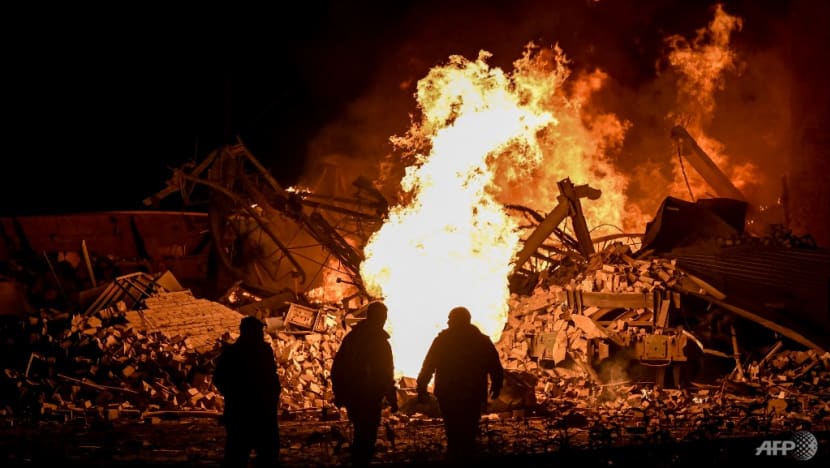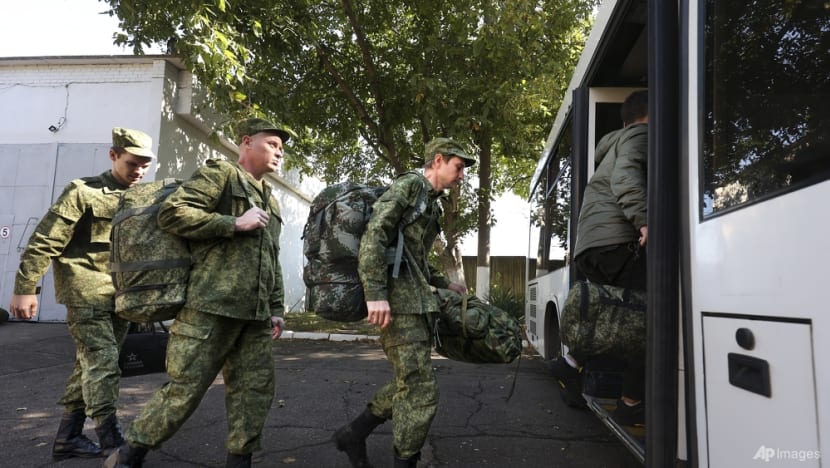Commentary: How would Putin use nuclear weapons if he escalates Ukraine war?
Russian President Vladimir Putin has once again threatened to use nuclear weapons. What if he’s not bluffing this time, asks Robert E Kelly.

Ukrainian firefighters stand in front of flames as a fire erupted at a depot of the freight railway station in Kharkiv, which was partially destroyed by a Russian missile strike, on Sep 27, 2022, amid the Russian invasion of Ukraine. (Photo: AFP/Sergey Bobok)
BUSAN: Russian President Vladimir Putin is in a tight spot. His invasion of Ukraine is flailing. He expected a quick victory when he launched his February attack. Instead, the war has degenerated into an expensive stalemate.
The Russian army took territory in the south and east early on but has been unable to make major gains since then. Putin’s best units are degraded after months of combat. Ukraine has fought back ferociously and launched a stunning counter-offensive earlier this month.
Putin has panicked, declaring a massive mobilisation of Russian reservists. But there is widespread belief in the analyst community that these forces will not win the war, just drag it out.
Russia does not have the logistical capability to deploy, train or kit these new forces properly. Reports are already emerging of these newly impressed reservists being sent to Ukraine with no training.
The sheer size of Russia’s mobilised army may slow down Ukraine, but it is unlikely to change the long-term outcome – Russian exhaustion and withdrawal.
This problem – how to win the war soon - is known in the Kremlin too. Hence Putin has made oblique threats since March, when the initial blitzkrieg failed, to use nuclear weapons.
This threat, presumably to scare the Ukrainians into negotiations and the West into halting aid for Ukraine, has not worked because there is great scepticism that Putin would actually go nuclear in a minor conflict (rather than against the North Atlantic Treaty Organization in much bigger war).
TOO BIG A RISK
Putin, like everyone else, has no good idea what would happen the day after a nuclear strike. Nuclear weapons are indeed powerful, but the world’s response to their use would be radically unpredictable. So Putin would be taking an enormous risk.
NATO might openly join the war, rapidly crushing Russia’s conventional forces. China and India would almost certainly distance themselves from Putin, badly isolating Russian diplomatically and economically.
Russian sympathisers in the West would be immediately discredited, and Russia’s relationships in the developing world would probably sour. Many non-aligned countries have sidestepped Western war sanctions on Russia and have sought to stay neutral. This would be much harder the day after a Russian nuclear strike.
Russians would be unwelcome all over the world, badly damaging the Russian economy, until Putin was out of power.
WHAT IF PUTIN IS NOT BLUFFING?
But what is Putin is not bluffing?
Russia has ramped up the nuclear rhetoric in recent days, with Putin saying on Sep 21 that “it’s not a bluff”. On Tuesday (Sep 27), former President Dmitry Medvedev repeated the nuclear threats on Telegram, saying “it's definitely not a bluff”.
Ukrainian President Volodymyr Zelenskyy, who has previously played down such warnings, is taking Putin seriously. "Maybe yesterday it was bluff. Now, it could be a reality," he said on Sep 25 after Putin’s televised address.
So, what are the conceivable scenarios for a nuclear escalation?
First, Ukraine might start rapidly winning the conventional conflict, pushing Putin and Kremlin hawks to consider radical new options to avoid national humiliation.
Ukraine’s counter-offensive this month surprised everyone in its speed and depth. There is concern Russian lines might completely collapse, as they did in World War I.
This was likely the reason for Putin’s panicked mobilisation of reservists. Russia is now clearly losing the war. If the reservists do not change that – and most analysts think they will not – then Putin might choose nuclear escalation to avoid open defeat on the battlefield.
Second, a more extreme hawk might replace Putin and demand nuclear escalation to win. Losing a war is risky for an autocrat.
Putin’s rule is now more vulnerable than ever. He is facing popular discontent on the street and anger from nationalists over looming defeat. If Putin is pushed out of power in domestic turbulence, he could be replaced by a reckless gambler willing to take the ultimate risk to win the war.

Third, Putin and his generals might find a genuinely valuable and large target where a battlefield nuclear strike would make a clear strategic difference in the course of the war. This is tricky, because even if Putin wants to go nuclear, it is not clear what he would strike which is worth the risk of huge geopolitical backlash.
There has been much debate among specialists about what Ukrainian target might meet that high standard, and the rough consensus seems to be that there is not one. For example, there is no obvious Ukrainian infrastructure target which is both so huge and so critical that it warrant the massive force of a nuclear bomb. One hardly needs nukes to blow up power grids or rail interchanges.
Similarly, the Ukrainian army is spread out all over the country, and therefore not vulnerable to one huge hammer blow. Indeed, it is likely widely distributed precisely to avoid providing an inviting target for a nuclear strike.
IS KYIV A TARGET?
Finally, Putin might use nuclear weapons against a large civilian target – a city like the capital, Kyiv – in an effort to terrify Ukraine into capitulation.
Russia has purposefully targeted civilians throughout the war, in missile and artillery barrages, and in executions and torture in conquered areas. This terror campaign has thus far failed to scare Ukraine into surrender.
A nuclear escalation of this terror campaign might work, and Putin might also eliminate the Ukrainian leadership if he nuked Kyiv.
So far Putin has bluffed with his nukes. Like everyone else in the world, he is likely nervous about what might happen if he took this large step.
Nuclear weapons have only been used twice in warfare, and there is a long-standing, if unspoken, norm against their use.
China and the United States, for example, never speak as casually about nuclear weapons as Putin does. Putin would be taking an enormous gamble if he did this, one even a gambler like him probably knows is too uncertain to risk.
Robert Kelly (@Robert_E_Kelly) is a professor of international relations in the Department of Political Science at Pusan National University.



















